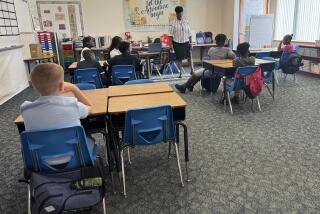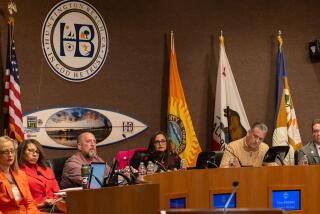Schools Miff Parents of Disabled Students
- Share via
When Cindy Reimer and her family bought a home in the Placentia area two years ago, they were investing not only in a house but in their disabled son’s education.
A special program run by the county at George Key School in Placentia provided Alex, 17, with the programs, instruction and caring teachers he needed.
But their investment turned sour after they learned by word of mouth that the program could move and their son could be forced to attend another school, a fact Reimer and her husband, Jeff, later confirmed with the principal.
In February, the Placentia-Yorba Linda Unified School District decided to terminate its lease come June with the Orange County Department of Education, which for 16 years has operated its Special School program for the disabled out of six classrooms at the George Key campus.
District officials said they need the space to accommodate a state-run medical therapy unit now operating at John O. Tynes Elementary School, which needs the space there to accommodate elementary school students coming from another campus. The district has offered to let the county put portable classrooms at George Key to continue some of its program.
The decision will affect 60 mentally and physically disabled students, most of whom would be transferred to six portable classrooms proposed at George Key. About 20 others would have to attend other schools.
District and county officials have yet to decide how or when the move will take place.
*
For parents such as the Reimers, the options are limited. Cindy Reimer stocks shelves for Kmart, and Jeff Reimer puts in 10-hour days six days a week as a machinist.
Alex, diagnosed with severe cerebral palsy, could end up attending less-equipped facilities at Troy High School in Fullerton, Cindy Reimer was told. When she visited the Troy campus, however, she found four bungalows adjacent to the school with no fencing in the back or the front. She told George Key officials she would not send her child there because she felt it was unsafe, that anyone off the street could walk into a classroom.
The situation has left other parents and relatives feeling frustrated.
“We have 60 kids here nobody gives a damn about,” said June Simon, grandmother of Kelly Burrows, a 14-year-old student who is blind, mentally and physically disabled and moves around in a wheelchair. “They see new housing developments, new students, and they make that a priority and it makes me mad.”
Some parents say they have yet to be formally notified about what’s happening at the school, while other parents say they just received a letter notifying them that the district and the county are engaged in talks to solve the problem.
District and county officials say they are doing everything they can to keep parents informed.
“All parents have been notified with at least a couple of letters saying we’re trying to design an adjacent campus to what we have,” said Larry Belkin, director of special education services for the county Department of Education.
Belkin said he has been meeting with district officials and architects in charge of redesigning George Key to accommodate students being transferred there from Tynes Elementary.
He believes the county might end up accommodating most of the special education students in the portable classrooms at George Key. Depending on the redesign, the county might end up having to bring in a portable restroom too.
The county has been leasing space at George Key for 16 years. The $56,000-a-year agreement includes use of a multipurpose room and restrooms. The rented space at George Key is specially designed to meet the needs of disabled students, complete with an auditorium area that they will lose once they move out, Belkin said.
The new classrooms would end up costing the county $24,000 each, with an extra $4,800 for a bathroom.
*
Some parents have made an effort to organize. Simon and her daughter sent slips of paper to other kids’ parents in an effort to get more information and find a way to stop the move.
“We heard from some parents,” Simon said. “But most didn’t know who we were or what we wanted.”
Like Reimer, Simon contends she has never received any information and found out about the problem through others. They fear portable classrooms and other facilities won’t be adequate for the children.
But district and county officials disagree, saying the portables may be an improvement.
“These classrooms will be newer, bigger and brighter,” Belkin said.
There may also be benefits for the students forced to leave George Key, he said.
They would be placed in groups with similar-aged students, something he says is frequently done in other school districts. The idea is to help integrate disabled students with those who are not disabled.
In addition, Belkin believes the county and the school district can work out a way to share the costs of building permanent classrooms in the future, something that has been done in other districts. But until a solution is found, neither the county nor the district can say what will happen with the students.
“The program is the responsibility of the county,” Placentia Unified spokeswoman Karen Bass said.
Belkin disagrees.
“We run it, but they pay for it,” Belkin said. “We don’t own any kids. These are the district’s kids.”
More to Read
Sign up for Essential California
The most important California stories and recommendations in your inbox every morning.
You may occasionally receive promotional content from the Los Angeles Times.













